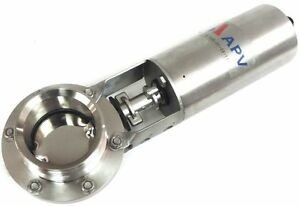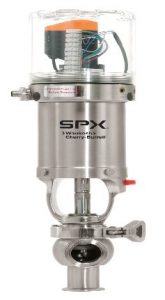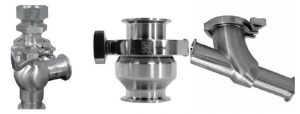Different Types of Sanitary Valves and Their Uses
A number of sanitary processing applications use sanitary valves to control the exact rate and flow of their fluid transfer. The most common places you will see these valves used include food and beverage production, pharmaceuticals, bio-medical products, chemical and petrochemical processing, and a number of original equipment manufacturing applications. To ensure we offer the equipment and brands needed for a variety of applications, Lincoln Suppliers supplies an assortment of sanitary valves from Waukesha Cherry Burrell, Flowtrend, Alfa Laval, APV, QCI, and Sharpe. Unsure what valve type will work best for your needs? We’re here to help!
Air Actuated Automatic Valves / Butterfly and Seat valves

Activated from external air and gas pressure, the main purpose of air actuated automatic valves is to open and close the liquid flow path, allowing for metered flow in one or both directions. For most applications, this will involve free flow from one direction, and controlled, reduced flow in the reverse. The most common applications for these types of valves include chemical and petrochemical processing, water treatment plants, power plants, and mining. At Lincoln Suppliers, we offer air actuated automatic sanitary valves from Waukesha Cherry Burrell, Flowtrend, Alfa Laval, and APV.
Shut-Off, Divert, and Throttling Valves

Similar in design, but each with distinct purposes – shut off, diverter, and throttling valves all aid in providing the best possible solution for various sanitary processing applications. Lincoln Suppliers offers all of these valves from names like Waukesha Cherry Burrell, Flowtrend, Alfa Laval, and APV.
- A shut off valve works to safely control pressurized air in a pneumatic application. This allows operators to block compressed air in an industrial automation process, and isolate systems while they are not in use. You will most often see sanitary shut-off valves used in sanitary waste treatment applications, chemical processing, food and beverage production, and metal processing.
- A diverter valve works to actively switch between different liquid flow paths, while preventing any possibility of backflow. Common applications include agriculture and farming, aviation and aerospace, chemical and petrochemical processing, food processing, pharmaceutical production, and sanitary waste processing.
- Throttling valves work with high-pressure applications to aid in flow control, pressure control, filler level control, and modulated filling. These valves are a popular choice when your application requires the ability to safely start, stop, and regulate liquid flow. These types of valves are commonly used for food and beverage processing, dairy processing, and for producing personal care products.
Check, Ball and Relief Valves

While all three of these sanitary valve types serve their own unique purposes, they all work with pressurized air and liquids within a sanitary processing application. Lincoln Suppliers offers all three types of valves from Waukesha Cherry Burrell, Flowtrend, Alfa Laval, and APV.
- Check valves, also referred to as “one-way valves” help control the flow of liquids and gases in one direction, and prevent backflow. This process is enabled by pressure differentials that cause the valve to open when pressure is higher on the input side, and close when pressure is higher on the output side. The most common applications for sanitary check valves include water treatment and reverse osmosis processes, food and beverage processing, chemical processing, and pharmaceutical production.
- Sanitary ball valves are ideal for any application that wishes to preserve the exact pressure levels throughout the fluid transfer process. A simple 90-degree turn moves a metal ball that can effectively turn on and off the valve, with almost no losses in pressure. Typical applications for sanitary ball valves include chemical processing, biopharmaceuticals, food and beverage production, and other personal care applications like lotions, soaps, and cosmetics.
- Relief valves help applications gain precision control over their compressed air systems, releasing excess pressure to prevent over-pressurizing the system. When a set pressure threshold is met at the valve seat, the force generated will open the valve against a spring tension. Operators can fine-tune the exact pressure rating necessary to open the valve by turning the control knob to increase or decrease the tension in the spring. This type of sanitary valve is common in any process that uses compressed air, such as industrial automation systems.
No matter the exact needs of your sanitary processing application, Lincoln Suppliers is likely to have the brand and valve type for you. All of our sanitary valves are designed with corrosion and vibration resistance, and are manufactured using FDA approved materials. Looking for an upgrade or replacement sanitary valve? Call us today at 844-818-1242, or visit our website to request a free quote. Our experienced staff will help you make an informed purchasing decision.

